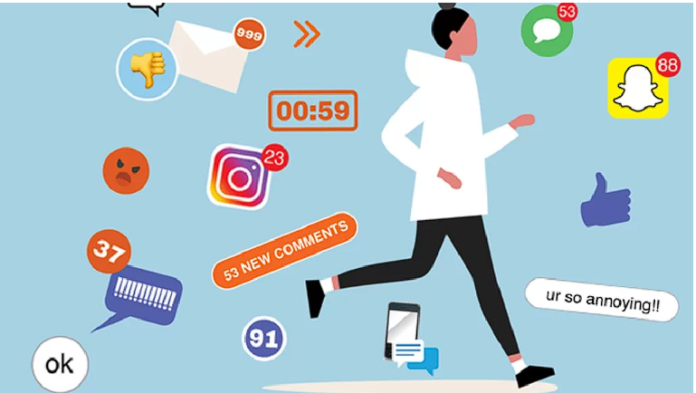The rise of social media has revolutionized the way people communicate, connect, and share information. Platforms such as Facebook, Instagram, Twitter, and Snapchat have become an integral part of daily life for billions of people worldwide. While social media has undoubtedly brought about numerous benefits, it has also raised concerns about its impact on society and mental health. This article delves into the complex relationship between social media and mental health, exploring both the positive and negative consequences of social media use on individuals and society at large.
- Positive Impacts of Social Media on Society and Mental Health
Despite concerns surrounding the potential negative effects of social media, it is important to recognize the many positive aspects of these platforms. Some of the key benefits of social media include:
a) Fostering Connections: Social media enables individuals to connect with friends, family, and like-minded people from around the world. This increased connectivity can help combat feelings of loneliness and isolation, providing individuals with a sense of belonging and social support.
b) Access to Information: Social media platforms provide users with access to a wealth of information and resources, facilitating the sharing of ideas and knowledge. This access can lead to increased awareness of various social, political, and health-related issues, ultimately contributing to a more informed and engaged society.
c) Opportunities for Personal and Professional Growth: Social media can serve as a platform for personal and professional growth, allowing individuals to showcase their talents, network with others in their field, and access educational and career development resources.
d) Social Activism and Advocacy: Social media has become a powerful tool for promoting social change, giving a voice to marginalized communities and facilitating grassroots activism. Platforms like Twitter and Facebook have played a critical role in raising awareness of social justice issues and mobilizing collective action.
- Negative Impacts of Social Media on Society and Mental Health
Despite its many benefits, social media has also been linked to a range of negative effects on mental health and well-being. Some of the key concerns surrounding social media use include:
a) Anxiety and Depression: Studies have shown a correlation between social media use and increased levels of anxiety and depression, particularly among young people. The constant comparison of one’s life to the curated and often unrealistic portrayals of others’ lives on social media can lead to feelings of inadequacy and low self-esteem.
b) Cyberbullying: Social media platforms can facilitate cyberbullying, which has been linked to serious mental health consequences, including depression, anxiety, and even suicidal ideation. Victims of cyberbullying often feel powerless, isolated, and humiliated, with long-lasting effects on their mental well-being.
c) Sleep Disturbance: Excessive social media use, particularly at night, can negatively impact sleep quality and duration. The blue light emitted by screens can interfere with the production of the sleep hormone melatonin, leading to sleep disturbances that can contribute to poor mental health.
d) Social Isolation: Paradoxically, excessive social media use can contribute to social isolation, as individuals may prioritize online interactions over real-life connections. This reliance on virtual relationships can result in weakened social ties and a diminished sense of belonging.
e) Decreased Productivity: The constant stream of notifications, updates, and distractions provided by social media can lead to decreased productivity and difficulty focusing on tasks. Over time, this can result in increased stress and feelings of overwhelm.
- Strategies for Managing Social Media Use and Protecting Mental Health
Given the potential negative impacts of social media on mental health, it is essential to develop strategies for managing social media use and protecting one’s well-being. Some key strategies include:
a) Setting Boundaries: Establishing limits on social media use, such as setting designated times for checking platforms or limiting screen time, can help prevent excessive use and reduce the potential negative impacts on mental health.
b) Mindful Consumption: Engaging in mindful social media consumption by being aware of the content being consumed and its impact on one’s emotions can help individuals make more conscious choices about what they view and interact with.
c) Prioritizing Real-Life Connections: Making an effort to prioritize real-life social connections over online interactions can help foster a more balanced and fulfilling social life. Scheduling regular in-person social activities and setting aside designated technology-free time can be helpful in maintaining strong social bonds.
d) Digital Detox: Periodically taking breaks from social media, known as digital detoxes, can provide much-needed respite from the constant bombardment of information and social comparison. These breaks can help individuals reconnect with themselves and the present moment, leading to improved mental well-being.
e) Seeking Support: If social media use is negatively impacting one’s mental health, seeking support from friends, family, or mental health professionals can be a critical step in addressing the issue and developing healthier habits.
Conclusion
Social media has had a profound impact on society and mental health, bringing about both positive and negative consequences. While social media platforms have revolutionized the way people connect, share information, and engage with the world, they have also been linked to increased levels of anxiety, depression, and other mental health challenges. By implementing strategies to manage social media use and protect mental well-being, individuals can harness the benefits of these platforms while mitigating the potential negative effects. As society continues to navigate the complex relationship between social media and mental health, ongoing research and open dialogue will be essential in promoting a balanced and healthy approach to social media consumption
